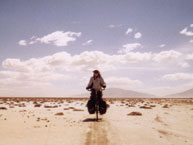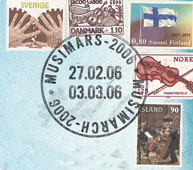Around campus
Across the Antiplano

Yannick Daoudi and Kathleen Mullin never dipped below 4,000 m during their Bolivian excursion.
Yannick Daoudi
Think a backpack and a Eurail pass qualify as roughing it? Yannick Daoudi might have something to say about that.
Daoudi, a lecturer at the School of Computer Science, spent last summer bicycling across over 2,000 km of the Bolivian Altiplano, an elevated stretch of desert plateau amidst the Andes. With only the barest of necessities (a bike, water filter, camping gear, cooking equipment and, of course, a mini-DV camera) Daoudi and his wife Kathleen Mullin spent May through August of 2005 documenting their excursion through the "extreme natural conditions" that characterize the Altiplano, whose landscape ranges from "surreal salt desert to boiling geysers to majestic snow-capped mountains." Combatting altitudes upwards of 4,000 m and sleeping in temperatures that "dropped to -20°C regularly," Daoudi and Mullin chose the Altiplano because it is "less-visited and wilder" than other locales, and because Bolivia is "culturally different," something not lost on the globetrotting couple, whose other cycling adventures have taken them through Thailand, Vietnam, Laos and Burma.
"We also remembered how the last one could have made an amazing documentary," says Daoudi in explanation, "so we decided to also try [filming the trip] this time."
Macdonald-Harrington Building, room G-10 on Wednesday, February 15, at 8 pm. Reserve online at www.Y2Ktravels.com/documentary. Admission is free but space is limited
Is Nordic music about pining for the fjords?

Courtesy of MusiMarch
Just because they live in icy climes doesn't mean Nordic composers only sing the blues. Music fans will get a taste of the Nordic musical smorgasbord at the end of the month at MusiMarch.
The third edition of MusiMarch, a co-production of the Société de musique contemporaine du Québec (SMCQ) and the Schulich School of Music of McGill University, will focus on the contributions of Nordic composers to the fabric of contemporary music. "Every year we focus on a specific culture or region of the world" says Denys Bouliane, Artistic Director at Schulich. "We try to present a focus so one has a sort of direction. If you hear a set of pieces that complement each other, you get a lasting impression of that culture." To further emphasize this point, celebrated composers Anders Hillborg (Sweden), Lasse Thoresen (Norway), Haukur Tómason (Iceland) and Bent Sørensen (Denmark) will all be in attendance at this year's MusiMarch. Each will present at least one work in its Canadian premier.
Also premiering at this year's installment is String Quartet No. 10 by Canadian R. Murray Schafer, whose work well echoes the Nordic composers' themes, according to Sylvie Brousseau, the SMCQ Communications Director. "There is a lot of snow in his music. You can feel the landscapes and soundscapes of winter."
MusiMarch, February 27 to March 3. For more info, including concert times and prices, go to www.smcq/musi.e/2006/index.html or call 843-9305.
The Boys of Buchenwald

From hopelessness sprang hope and from hatred grew love. Liberated from the Buchenwald concentration camp in 1945, three young Jewish boys, Robbie Waisman, Elie Wiesel and Joe Szwarcberg were among hundreds of orphans who emerged from the horror with nothing. Having lost their families, the boys created a fraternity based on need and banded together against a world they did not trust.
Their new life began at a children's home in France, where, struggling to adjust, the boys slowly began to see the good in people. "We had to learn how to rediscover joy and affection," says Wiesel, who went on to write over 40 books and was awarded a Nobel Peace Prize.
The documentary, The Boys of Buchenwald, follows the "boys" as they meet again 60 years later. The bonds of friendship that helped them to rebuild their lives after the Holocaust are still strong. Using archival footage, stills and interviews, the film details the story of the young boys who survived the nightmare of Buchenwald.
The Boys of Buchenwald will be shown as part of the Department of Oncology's "Films that Transform" monthly series. Following the film, special guest Rabbi Reuban Bulka will moderate a discussion on "Determinants of wounding and healing in the wake of tyranny."
Tuesday, February 14 at 7 pm in Moyse Hall, in the Arts Building (853 Sherbrooke West). $10 each, $5 for students & seniors. For more information contact 398-2298 or visit ww.mcgill.ca/wholepersoncare/filmseries
As if being a kid weren't tough enough...

Tzigane
With a new century comes a new set of childhood woes. Unlike their more traditional counterparts, cyber-bullies employ electronic information and communication devices to harass their victims, including sending threatening messages via email and instant messaging, and setting up websites to mock others. The issue has become enough of a concern that an evening has been set aside to confront and discuss the problem at a community level.
"Everyone needs to work together to address this," says education professor Shaheen Shariff, who, along with Bruno Mital from Kids Help Phone Quebec, will be moderating the public conversation. Determining "how to split responsibility between parents and schools" is one of Shariff's main goals for the discussion. Shariff also hopes to determine the legal responsibility of various institutional bodies with regard to policing this kind of "anonymous, insidious" aggravation and its proliferation in cyberspace. This kind of abuse is "relentless, deliberate and persistent" according to Shariff, who as a parent and researcher seeks to explore the roots of the behaviour, and "not just the medium" that supports it.
Monday, February 20, 6:30 pm to 8:30 pm, Ole's Pub (McGill University Faculty Club, 3450 McTavish). RSVP to Sophia Johnson at 398-7684, or at sophia.johnson@mcgill.ca. Admission is free but space is limited.
Black History Month - Haiti: The Untold Story
As part of Black History Month, the Black Students' Network, in collaboration with QPIRG McGill and Haiti Action Montreal, will be screening the documentary Haiti: The Untold Story. Following the film, noted Haitian activist Patrick Elie will discuss his past as Minister of Defense in Jean-Bertrand Aristide's government, his current role as activist and the future of Haiti.
Friday, February 17, 7 pm; Leacock 219. Admission free.

